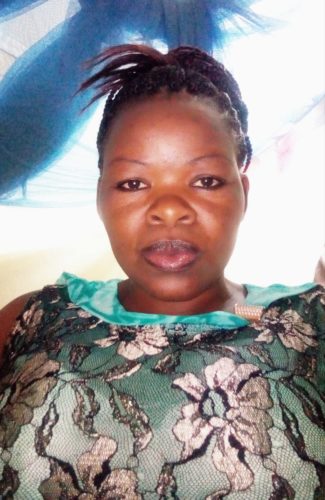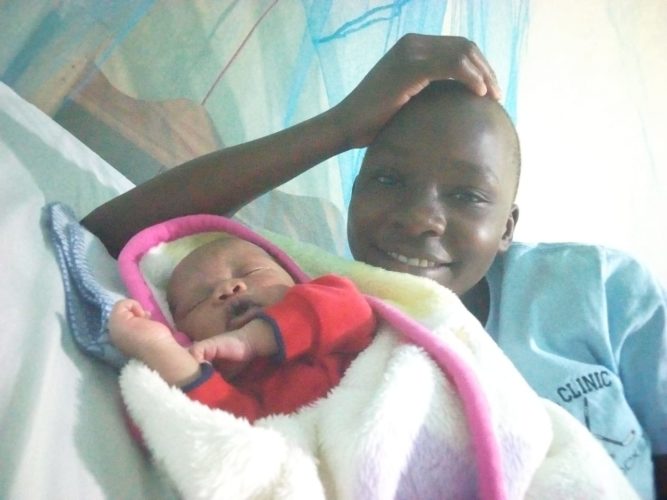Thirty-year-old Josephine Miduma has made it her life’s mission to rescue girls who have been forced into child marriages and flee due to abuse or mistreatment. While her training as a social worker gives her enormous insight into societal ill and remedies, her own story has allowed her to be even more effective because she can relate to the girls she saves. At just 16, she was forced to marry a man four times her age.
“I was told 3 months before the day that somebody was going to come and marry me,” Josephine told The Weight She Carries. “When I asked my mother why they were planning this for me, she told me that she was also married off the same way, so I should not fear. She said the man was wealthy and I would live well. So when the man came, I went with him.”
Although the legal age of marriage is Kenya is 18, many girls are still being forced to marry before they reach that age. According to UNICEF, 23 percent of Kenyan women in 2017 were married under the age of 18.
No one prepared Josephine to be a wife.
Unbeknownst to her, the dowry had been paid to her parents while she was growing up. So once the man she had been promised to completed his payments, he came to collect his bride.
“I became the third wife to this man. The man I married was 63, and the first wife was the age of my grandmother,” she said.
“When I arrived at the man’s home I was treated like a maid. I couldn’t object to anything. I became completely depressed. After a year, I was pregnant. After the baby came, it was so difficult for me because I didn’t have any income to take care of me and the baby. My husband was old, unemployed and could not support me and my child. Not to mention the other two wives and their children.” – Josephine Miduma
Being the youngest wife, Josephine felt so alone. She had no one to talk to who understood her.

“The first wife would always greet me and say, ‘Hello, my granddaughter.’ I felt that was to mock me because she knew I was her co-wife and yet she called me granddaughter,” Josephine said.
The second wife constantly ask Josephine why she left her parents’ home to marry an old man.
“Was it because you are so poor that you needed to come and get this old man?” she would ask.
“I was so ashamed. I wanted the ground to open up and swallow me. I didn’t even want to go to church. I didn’t want to go anywhere where people would be and ask, “Are you the one married to that old man?” – Josephine Miduma
The concept of plural wives was not so farfetched in Josephine’s community. Her father, now deceased, was a polygamist with four wives, her mother being the first.
Josephine lived with her husband for 3 years before deciding enough was enough. She decided to go back to her parents’ home.
Her parents were upset because her husband went to their home demanding the dowry back. But the money had been used to educate the boys in the family. Since they couldn’t give it back, they sent their daughter right back to her husband’s home.
“My mother said that she got married the same way so there was nothing wrong with me being married off the way she was. She said there was no reason I should come back and that I was not suffering. But I was. I was labouring in the fields, and I had very little money. Sometimes when the baby was sick I would not even have money to take the baby to the hospital.” – Josephine Miduma
“With nowhere else to go, I decided to go to my uncle,” she said. “He lived in a nearby town. So when I went there I explained everything to him. He and his wife accepted me into their home. They also asked me if I wanted to start back at school. I said yes.”
Josephine’s uncle and aunt paid her tuition and became the support system she desperately needed.
“I would leave the baby with my aunt and attend classes. I decided to focus on community development and social work because I wanted to do something I could use to help me impact my community,” she said.
“Initially, my parents did not want to hear from me. Even though I apologized to them, they were too disappointed to accept me. But now I go home freely. In fact, my mother now regrets the way they treated me and has apologized to me, but it is too late to change what happened.” – Josephine Miduma
Soon after completing her studies, Josephine began volunteering at a children’s facility where she saw many girls who had experienced the same things she had.
“Some were forced into marriage, some were raped, some were survivors of female genital mutilation, and many others,” she said. “I tried to figure out how I would help these girls get out of the situations they were in.”
Josephine approached a child advocate who told her where she could find some child centers. But the problem she faced was that when she tried to rescue some of the girls, their parents would follow her and ask why she was destroying their marriages.
“Some would attack me physically, but I would run to the police for help. I would identify myself as somebody who was trying to rescue the girls and they would help me,” she said.
Josephine’s work keeps her busy. Given the potential danger involved with such delicate matters, she has quickly learned the best way to deal with situations as they arise.
“When I work at the hospital, a girl may come for prenatal care. Maybe she’ll be 13 years old and pregnant. I ask the age of the husband; I ask how they live, but because I’m not there to ruin their marriage, I don’t advise girls to leave,” Josephine said. “The only time I do that is when the girl has fled and is no longer living with her husband. If she indicates that she no longer wants to live with him, I will help her.”
Josephine has remarried and now has two children. Her oldest daughter is now 13, a few years younger than Josephine was when she was forced into marriage.

“Due to what I went through, it has always been my desire to start a girls rescue centre, and to that end, I currently live with four survivors in my small rented house. Even though there are several girls who need to be rescued and my heart breaks for them, I have not been able to rescue them all due to lack of funds.” – Josephine Miduma
Josephine hopes her story will bring much needed attention to the needs of the girls she is so desperately trying to save.
“To all the young girls who find themselves in the same situation I was in, report your case to the responsible bodies so you can get help. God will make a way for you,” she said.
Vimbai E. is a content marketer, ghostwriter, and the founder of The Weight She Carries. With hundreds of articles and stories publishing online, in print and for broadcast, her love of language and storytelling shines through every piece of writing that bears her name.
